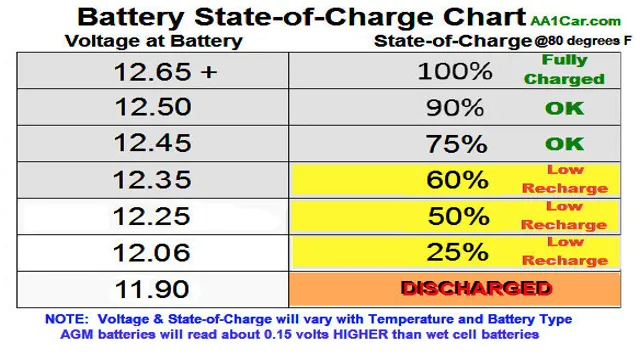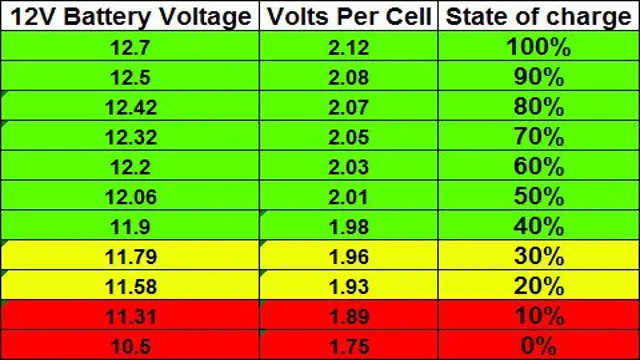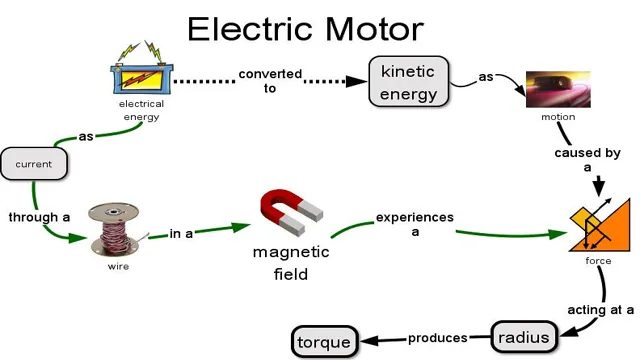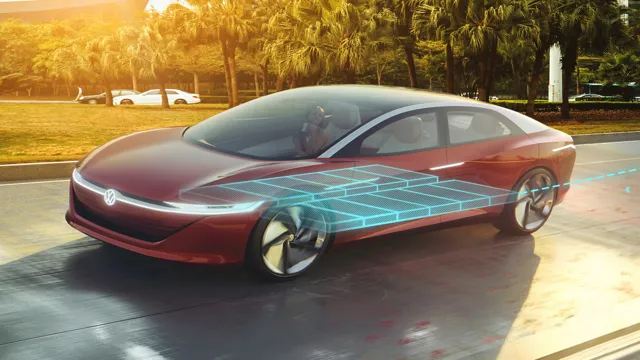Demystifying Electric Car Battery Voltage and Amps: Everything You Need to Know
Electric cars are becoming increasingly popular as people become more conscious of environmental concerns. With this shift in transportation, it is important to understand the technicalities of electric cars, particularly their batteries. Electric car battery voltage and amps play a crucial role in how these cars operate.
However, for the average person, understanding these concepts can be intimidating. Fear not, this blog post will break down the jargon and explain what you need to know about electric car battery voltage and amps.
What is Battery Voltage?
Electric car batteries rely on voltage and amps to power the vehicle. The voltage of a battery measures the amount of electrical pressure it can provide, whereas the amps measure the amount of electrical current it can supply. It’s important to note that these two measurements are interdependent, as increasing the voltage will decrease the amp output and vice versa.
Generally, electric car batteries have a voltage range between 400-800 volts, which allows them to provide enough power to the electric motor while also sustaining a longer range for the vehicle. The amp output varies based on battery size, chemistry, and temperature conditions, and it’s crucial to consider it when determining the charging time for your electric car battery. Therefore, it’s essential to understand the relationship between the battery voltage and amps when choosing an electric vehicle and managing its battery life to optimize performance and longevity.
Definition and Importance
Battery voltage refers to the electrical potential difference between the positive and negative terminals of a battery. It is measured in volts and determines the amount of electrical potential energy a battery can provide to an electronic device. The voltage of a battery is an essential factor in determining the performance and lifespan of electronic devices that rely on battery power.
Lower voltage batteries may not provide enough energy to power high-demand devices, while higher voltage batteries can cause damage or failure of electronic components. Therefore, it’s crucial to check the voltage requirements of your electronic device before choosing a battery to use. Understanding the importance of battery voltage is vital in ensuring that your devices operate efficiently and last longer.

Effects on Car Performance
Battery voltage is a crucial component when it comes to the performance of a car. Put simply, it is the measure of the force with which electricity flows from a car’s battery to its electrical components. The voltage of a car battery can range from 12 to 14 volts.
It is essential that your car battery has the correct voltage level to maximize the performance of its electrical systems. Low voltage levels can cause a wide range of issues, including difficulty starting the car, lower fuel economy, and slower acceleration. In contrast, a higher voltage level can damage the car’s electrical components, causing them to fail prematurely.
To ensure your car’s performance is optimized, it is vital to monitor and maintain the correct voltage level of your battery. By doing so, you can maximize your car’s performance while also extending its lifespan.
What are Battery Amps?
When it comes to electric car battery voltage and amps, it’s important to understand what battery amps are. Battery amps, or amps for short, refer to the rate at which energy flows from the battery. It’s essentially the measurement of electric current that the battery can supply to power a device.
In an electric car, the battery amps are important because they determine how much power the car can draw from the battery at any given time. The more amps the battery can provide, the more power the car can use. However, it’s important to note that this also affects the overall lifespan of the battery.
A higher amp rating can lead to more strain on the battery and may cause it to degrade more quickly. Therefore, finding the right balance between power and battery life is essential to the proper functioning of an electric car.
Definition and Importance
Battery amps, also known as ampere-hours or Ah, is a measure of a battery’s capacity to store electrical charge. Put simply, the higher the battery amp rating, the longer the battery will last before needing to be recharged. This is important to consider when choosing a battery for a particular device as the wrong amp rating could result in a shorter battery life or even damage to the device.
It’s important to note that battery amp ratings are not the only factor to consider when choosing a battery, as the voltage and chemistry of the battery also play important roles in determining its performance.
Effects on Car Range and Charging Time
Battery amps play a crucial role in the range and charging time of electric cars. Essentially, battery amps refer to the amount of electrical current that is flowing through a battery system. This determines how quickly the battery can be charged up, and ultimately, how far the car can go without needing a recharge.
A higher number of battery amps could mean faster charging times and longer range capabilities. However, it’s not as simple as just using more amps, as higher amperage can also lead to overheating and other issues. The ideal amperage for a car battery depends on a number of factors, including the car’s voltage and the type of charging unit being used.
It’s important for car owners to educate themselves on battery amps and how they affect their electric car’s performance to ensure they are getting the most out of their vehicle.
Typical Voltage and Amps for Electric Cars
When it comes to electric car batteries, voltage and amps play a significant role. The typical voltage of electric car batteries ranges from 200 to 600 Volts, depending on the manufacturer and model. In comparison, the average voltage of a traditional lead-acid battery is only 12 Volts.
As for amps, electric cars have a high amperage output, ranging anywhere from 50 to 400 amps, based on the particular model. High amperage is necessary to power the electric motor, which is responsible for powering the vehicle. It’s important to note that the battery’s voltage and amperage affect the overall performance of the car, including its acceleration, top speed, and maximum range.
While electric cars can be pricier than gasoline-powered vehicles, their efficiency and low maintenance costs make them a popular choice for environmentally-conscious consumers.
Examples of Electric Car Models and Battery Specs
When it comes to electric cars, it’s essential to understand the typical battery specs to get an idea of their range and power. Most electric vehicles (EVs) have a voltage of between 400 to 800 volts and average amps of 200 to 400. For example, the popular Tesla Model S has a battery voltage of 350-450 volts and an average of 300 amps.
Going further, the Chevrolet Bolt has a voltage of 350 volts and an average of 200 amps, allowing a range of 259 miles on a single charge. It’s worth noting that the battery’s voltage and amps determine how much energy can be stored and delivered to the vehicle’s motor. Thus, electric car buyers should consider these factors when selecting a car to meet their needs.
Comparison of Voltage and Amps across Different Brands
When it comes to electric cars, understanding the typical voltage and amps for different brands is important for both car buyers and electricians. The voltage of an electric car battery determines its overall power output, while the amps determine the rate at which the power is delivered. Tesla, for example, is known for having higher voltage and amperage compared to other brands, resulting in quicker acceleration and higher horsepower.
On the other hand, brands like Nissan have lower voltage and amperage which result in a longer driving range. Of course, the voltage and amps will vary depending on the specific model of the electric car. Ultimately, it’s important to consider your driving needs and preferences when choosing an electric car based on these factors.
Conclusion: How Battery Voltage and Amps Impact Electric Cars
In conclusion, electric car battery voltage and amps are like the dynamic duo of the electric vehicle world. Voltage provides the energy to power the car, while amps deliver that energy at a consistent rate. Think of voltage as the Batman to amps’ Robin – without one, the other can’t succeed.
Together, they keep electric cars zooming down the road, and hopefully one day, we won’t even have to think twice about plugging in for a quick charge. Until then, let’s keep rooting for the electric car team to save the planet, one watt at a time.”
FAQs
What is the average voltage of an electric car battery?
The average voltage of an electric car battery is around 400 volts.
How do I know if my electric car battery needs to be charged?
Most electric vehicles have a battery indicator that shows the current battery level. Additionally, you can check the car’s range to see how much battery life is left.
What is the typical amp-hour capacity of an electric car battery?
The typical amp-hour capacity of an electric car battery can vary, but it is generally between 30 and 100 kWh.
How long does it take to charge an electric car battery?
The charging time for an electric car battery can vary depending on the type of charger and the size of the battery. On average, it can take anywhere from 30 minutes to several hours to fully charge an electric car battery.




